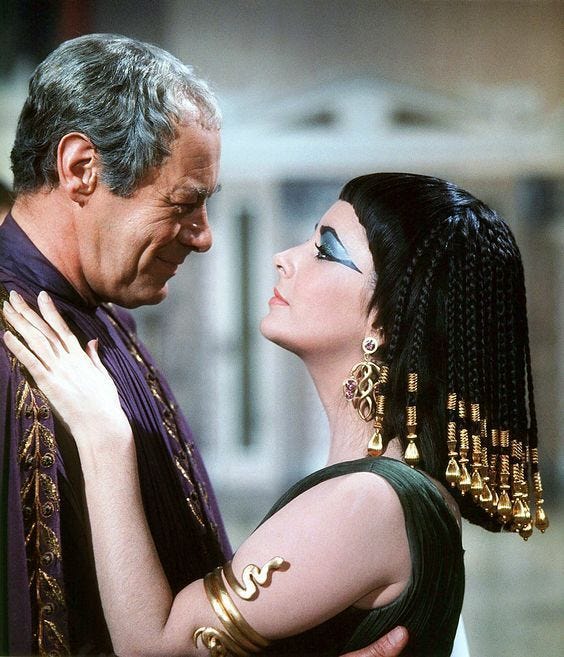I have immortal longings
Mankiewicz's Cleopatra (1963), Shakespeare's Antony and Cleopatra (1607), any other Cleopatra
The four-hour Cleopatra movie, the one with Elizabeth Taylor, is worth it. Coming to it for historical accuracy or with the intention of feeling represented is obviously futile, but it is a fun film: full of Anglo wit, lavish vintage-looking panoramas, and surprising aesthetic choices.
Whatever your level of investment in ancient history, the film’s got you. It moves quickly through the beats: Roman greatness built upon Egyptian riches; the ineffectual brother-king; the dusty, tanned, obviously English Caesar smiling ironically at Cleo the wilful little fox; the library of Alexandria in flames — here, Cleopatra is appropriately angry but easily placated. By lovemaking? by attention? Of course not. Like all women of her calibre, Cleopatra can only be placated by the opportunity to plot.
Liz Taylor’s Cleopatra is a mid-century Hollywood vixen: she is irresistible when she needles and provokes. She rarely betrays any signs of taking Caesar seriously: mocks his background (“barbarian!”), questions his judgment, ridicules his strategy, obliquely threatens his life. But she becomes serious when asserting her own impossible — delusional, even — sovereignty.
Let’s pause here, on this scene, and watch Cleopatra in her ascendancy. After all, Caesar is just the first act, the trial run. Greater glories await: the purple sails, the dissolved pearl, Marc Antony cosplaying as Dionysus. All of these stories, refracted in films and plays and AI fever dreams, are just the full fruition of Cleopatra’s innate ability to dream big.
Far be it from me to doubt the power of delusion. Sheer force of will, not backed up by reason or resources, has launched me across continents. In love and work and other troubles, it has allowed me to defy and smite my enemies. And no, this is not about manifestation; we’re less in the “I am abundant” territory here and more in “I am Isis”-level crazy talk territory.
Delusion works. Try it. Go ahead. Imagine. Your life — but fulfilled, unsullied. You are in full glory. Sovereign, if you will.
We can propel ourselves into the future by imagining things working out, and this helps us work things out. Those riches, those purple sails, the Roman hunk acting as our puppet. All of this can, indeed, be real.
But you and I know: a story cannot end in triumph. Certainly not this story, which is not really about Cleopatra wrapping an old man around her finger any more than it is about Cleopatra riding a Sphinx into Rome, or luxuriating in a spa, or dividing the known world among her children. The story is about the loss of one’s realm.
Because life is no joke, whatever we imagine as our realm is a real place — Lord help us — and it has been doomed from the start. Our grain may be plentiful, but it has been siphoned off for someone else. Our allies may be strong, but our fortunes will rise and fall with theirs (“Only yesterday, Pompey was a god,” as Cleopatra reminds us).
Things are going badly, and knowing it feels bad. This knowledge paralyses the muscles, closes off the throat. But if we resist this knowledge, we’ll have to keep shoving imaginary conquests down our own throats to close the gaping hole in the heart of the realm. And then we will not be able to breathe anyway.
The art of living well is the art of losing. You can release it all. It’s all already lost.
In the immortal words of Shakespeare’s peasant who snuck the asp into Cleopatra’s chambers, I wish you all joy of the worm.
***
If you enjoyed this, let me know!
Now for some links:
Read my take on another alternative to the girl boss path here
Read C.P. Cavafy on losing Alexandria and bookmark for future use
Watch the Uzbek-Russian singer Aziza’s 1989 music video in which she shows us how it’s done
Watch this 1988 staging of Mikhail Fokin’s 1908 ballet Egyptian Nights for more over-the-top fun
Watch Igor Chernyshev’s 1979 ballet Antony and Cleopatra when you’re in the mood for sustained tension and a more sombre take on tragedy
And that’s it from me. I leave you with this visual.








